BSc (Hons) Diagnostic Radiography and Imaging
Combine health and science, patient care and advanced technology to launch your career at the forefront of modern medicine. Gain the practical experience and skills to provide supportive and specialist care to people of all ages.
-
Typical offer: 120–128
Entry requirements -
Fees: £9,535 per year (UK)
Full details -
UCAS code: B821
-
Course length: Full time: three years
Find out more -
Location:
- University of Hertfordshire, Hatfield
-
Institute code: H36
NHS Learning Support Fund
- Training grants of at least £5,000 a year are available for eligible healthcare students which you will not have to pay back.
- You may also be eligible for an additional £2,000 towards childcare costs to help balance your studies with family life and £3,000 for students who find themselves in unforeseen financial hardship.
Course overview
Diagnostic radiographers play a vital role in healthcare, working closely with doctors and other healthcare professionals to produce imaging services for the diagnosis and treatment of injuries and disease.
On this radiology degree, you will deepen your knowledge in a range of subjects to become a skilled and competent practitioner, from human anatomy to physiology and pathology. You will develop advanced imaging, as well as communication skills, equipping you to work in a team environment, with the needs of the patient at the centre of everything you do. You’ll also gain an appreciation of research methods and the importance of evidence-based practice in the profession.
Radiographers trained in the UK are recognised as being among the best in the world, providing graduates with exciting international career opportunities. Once registered as a diagnostic radiographer, you will be able to practise in a range of healthcare settings. The profession is constantly evolving, and, as a radiographer, you’ll be able to specialise further into areas including ultrasound, computed tomography and magnetic resonance imaging, among others. Research and training opportunities will also be available to you.
Why choose this course?
This BSc Diagnostic Radiography degree will define your career in modern healthcare: You’ll gain the clinical skills, knowledge and practical experience to practise in a range of settings.
You will benefit from outstanding facilities: Your learning will be enhanced through our dedicated imaging labs, CT scanner and X-ray rooms. You’ll also benefit from our virtual reality simulation software to develop your skills and practise in a safe environment. Our dedicated ultrasound equipment and simulated operating theatre with imaging intensifier and inpatient ward with mobile X-ray machine provide further invaluable learning opportunities.
Excellent placement opportunities offer invaluable clinical experience: You will spend time working with qualified practitioners in a range of healthcare settings. Radiography courses at the University of Hertfordshire are supported by over 30 affiliated hospital sites across Hertfordshire, Bedfordshire, Cambridgeshire, Essex, London, East Midlands and South-Central regions.
Strong employment prospects: Radiology degree graduates are in high demand. 98% of Herts health, nursing and social care graduates are employed or in further study 15 months after graduation (Graduate Outcomes, 2021/22).
This course offers professional accreditation: As a graduate of the BSc Diagnostic Radiography and Imaging, you will be eligible to apply for registration with the Society and College of Radiographers (SCoR) and the Health and Care Professions Council (HCPC).
Be inspired by our highly qualified teaching staff: You will study with a range of health professionals, benefiting from a wide range of experience and expertise.
Professional accreditations
As a graduate of the BSc Diagnostic Radiography and Imaging, you will be eligible to apply for registration with the Society and College of Radiographers (SCoR) and the Health and Care Professions Council (HCPC). This will enable you to launch your career and practise as a qualified diagnostic radiographer, producing patient-centred imaging services for the diagnosis and treatment of injuries and disease.
Your future career
This radiography course will equip you with the expertise and skills to become a radiographer in a well-respected profession, with interesting and reward career opportunities in either or both NHS and private sectors.
Typical roles for radiography graduates include:
- diagnostic radiographer
- ultrasound imaging radiographer
- magnetic resonance Imaging (MRI) radiographer
- therapeutic radiographer
- research
- training and education.
The NHS has a grading structure that allows for career advancement and recognition as your skills and knowledge progress.
We will get you ready to stand out in the graduate job market. This radiography course is specifically designed to ensure you leave with the skills and knowledge to succeed in your career. You will benefit from CV-boosting opportunities and optional modules that further enhance your employability.
See what recent graduates are up to
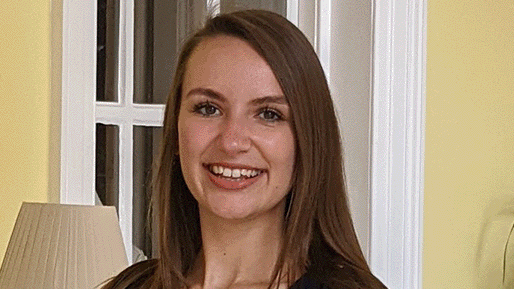
Gabby Caroleo
Senior Radiographer at NHS
Meet Gabby. Gabby was working as a radiology department assistant at her local hospital, but wanted to become a radiographer. She fulfilled her ambition by studying at Herts, and is now working in a job she loves.
Fantastic facilities
Gabby was working as a Radiology Department Assistant at her local hospital before she decided to study the BSc (Hons) Diagnostic Radiography and Imaging course at Herts. She loved her job but when she watched radiographers at work, she knew that is what she wanted to be.
Gabby chose Herts after attending an open day with her family. She says, ‘The equipment they have there, such as CT scanners and X-ray rooms, blew us away. The lecturers I met were all kind, supportive and enthusiastic too.
‘Herts is also close to my home and everyone I had spoken to who studied there loved it. They couldn’t recommend the course enough!’
Achieving her ambitions
Gabby fulfilled her ambitions and is now a Senior Radiographer in the cardiac catheterisation laboratory at the Gloucestershire Hospitals NHS Foundation Trust. Gabby says, ‘Herts prepared me well for this role. Staff were supportive during the entire course, and they gave me more confidence and helped guide me in what I wanted to do. Everyone at Herts, from the lecturers to the people on my course, were lovely.’
Gabby’s advice
Gabby’s advice to current and future Herts students is to, ‘Enjoy every moment. Take every opportunity and accept all the support offered to you. Every lecturer wants you to succeed and they will always help you get to where you want to be – never be afraid to ask for help!’
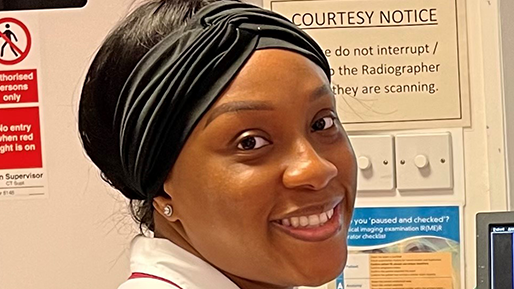
Isio Orogun
Senior Radiographer at NHS
Meet Isio. Isio's drive to help people led her to the BSc (Hons) Diagnostic Radiography and Imaging degree at Herts. She is now a senior radiographer in the NHS, with ambitions to become a sonographer.
An enriching job
Isio’s drive to help people led her to the BSc (Hons) Diagnostic Radiography and Imaging course at Herts. She says, ‘Radiography has the perfect balance between providing patient care and using jaw-dropping technology. I enjoy working alongside doctors and nurses to get to the root of a patient’s illness or symptoms, and I find the job enriching.’
Herts is not too far from London, where Isio lives, but far enough away from home that she could get the full university experience. ‘Herts has amazing nightlife, and the campuses are modern, with lots of activities and fun things to do there.’
Isio came to Herts on our Performance Sport Programme scholarship. She is a sprinter who competes in 100m and 200m at a county level, and she has also been a national champion in 200m.
Isio’s favourite memories
One of Isio’s favourite memories from her time at Herts is when she hosted a Christmas dinner and games night with friends in her campus accommodation. Isio says, ‘We all cooked different things and feasted over a few nights before we all went home for Christmas. The vibes were great, the music was great, and we got into a few heated arguments during the games. All in good fun!
‘During our degree, we would often reserve rooms in the library and study together for hours. We would then treat ourselves to dinner in the Galleria. If we had a good study session, we might have even treated ourselves to a movie in the cinema.’
Her next steps and advice
Isio is now a Senior Radiographer in the NHS. She believes her time at Herts prepared her well, as she went on placement during her course to large hospitals that allowed her to expand her knowledge of healthcare. She also took part in several group projects at Herts involving different disciplines, such as nursing, paramedic science, and midwifery.
Isio says, ‘After a few years developing my skills in the NHS, I’d like to do a postgraduate course and become a Sonographer, where I can do ultrasound scans.
‘My advice to current and future Herts students is to enjoy being a student while it lasts. Make sure you balance your academic studies with other parts of life. Your studies are crucial, but make time to socialise, relax, and look after yourself. And don’t hesitate to seek support or delegate tasks if you start to feel overwhelmed.
‘I’d also recommend attending events, seminars, and workshops outside your area of study. Networking with professionals and engaging with the broader academic community can enrich your university experience and help you secure a job.’
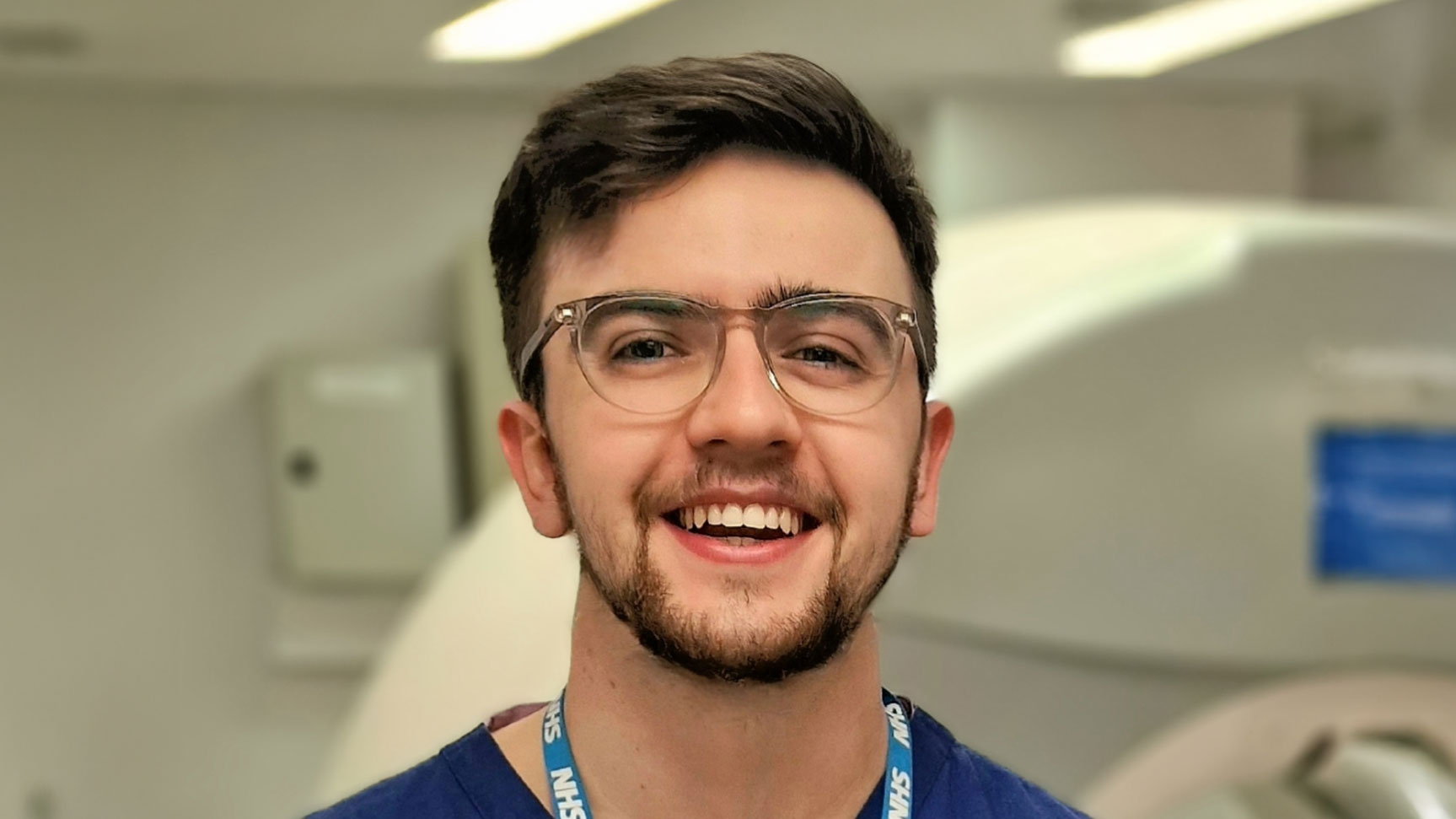
Jordan Murtagh
CT Radiographer at Bristol Royal Infirmary
Meet Jordan. Driven by a passion for science and technology, he decided to move from Ireland to study radiography at Herts.
Finding his passion
Jordan had a keen interest in science and technology at school, and after doing work experience at a hospital in his native Ireland he discovered that radiography was perfect for him. His next step was to choose which university he wanted to go to.
Jordan explains, ‘I had several options. I could have stayed in Ireland, but I saw the BSc (Hons) Diagnostic Radiography and Imaging course at Herts and was keen on it. I attended an open day and an interview, and my first experience was positive. The staff made me feel at home and everyone was welcoming. Current students were also at the open day to answer any questions I had, and we were given a tour of the facilities which are great.’
As an international student, the University’s proximity to London and its airports was important to Jordan, as it allowed him to travel back to Ireland easily to visit family and friends.
Immersing yourself
Jordan had a fantastic time at Herts, which he credits to his lecturers and friends he made along the way. Jordan says, ‘My lecturers made learning enjoyable and taught us in different ways. There were group exercises, image interpretation workshops, and lectures – and you were always encouraged to get involved in learning activities.
‘I went on placement too and the structure of it was great - it prepared me well for clinical practice as a qualified radiographer. I had a lecturer who would often check in to see if I was doing all right and I was assigned a clinical coordinator at the hospital who I could always rely on for support.’
Jordan immersed himself more in extracurricular activities during his second year and started playing rugby at Herts. He also frequented the gym and pool at Hertfordshire Sports Village on the de Havilland campus. Jordan adds, ‘Getting involved in your course or a club makes such a difference. I now live in the UK and many of my friends here are Herts graduates too. Because Herts is a campus-based university, it’s easy to make friends and meet new people.
‘This is true even in an academic sense. I will always remember graduating and being told by a lecturer that I was now their colleague, which added to the huge sense of pride I had completing the course.’
An exciting future in radiography
Jordan is now a CT Radiographer at the Bristol Royal Infirmary. He says that the future of his profession is exciting, and he is looking forward to seeing how artificial intelligence will improve treatments for patients in the future.
His advice to Herts students and soon-to-be graduates is to, ‘Be curious. Don’t be afraid to ask questions or get something wrong. Making mistakes is often where we learn the most. And most importantly, get involved and immerse yourself in your course and the student experience. Taking the initial step is difficult, but you will thank yourself afterwards.’
What you'll study
On this full-time, three-year radiography degree, you will study five modules per year designed to promote learning through a variety of activities, including lectures, seminars and tutorials.
You’ll benefit from our dedicated X-ray rooms and CT scanner on campus to enhance clinical skills education, as well as our state-of-the-art computer laboratories used for image evaluation and interpretation teaching.
In your first year,a diverse range of subjects introduces you to fundamental knowledge and skills in professional practice, imaging practice, anatomy, physiology and pathology and technology and science. Modules make use of a wide range of learning modes, including large group lectures, small group seminars, small group practical sessions, image evaluation and imaging viewing sessions and simulation activities. You will complete two clinical placements in the first year of the programme, where you continue to learn by linking theory to practice and develop the skills required to work as a diagnostic radiographer.
Year 2 follows a similar structure to Year 1, with a focus on developing the teaching from the first year due to increasing complexity of the content. The focus in on developing professional practice, understanding more complex imaging modalities and supporting this with increased knowledge and understanding of anatomy, physiology and pathology of the body systems and science and technology to underpinning these types of imaging. Year 2 also introduces you to the importance of research and critical thinking in this professional discipline. You’ll complete three clinical placements in this year of the radiography degree.
In your final year, you are supported in preparing for your role as autonomous practitioners within the healthcare environment. Key elements regarding employability, responsibility and accountability are explored, alongside further development of research skills to ensure you are enquiring practitioners when you qualify. Consideration of interprofessional working, the role of imaging in service users' health journeys and primary clinical evaluation are key aspects of the programme at this level. You will complete two clinical placements in this year of the programme.
Assessment across the programme includes a range of computer-based tests, written coursework, professional discussions, OSCEs (objective structures clinical examinations) and clinical assessments.
All of your modules will be supported through a web-based learning platform, aimed to guide you through your student journey. This is a mobile-friendly platform, and includes timetable information, teaching resources, assessment details and interactive maps to help you navigate your university experience. It will also provide you with access to all of the news, events and services in the wider University community.
What if I need support?
You’ll have a personal tutor to guide you through your course, all the way to graduation.
If you need additional support during your time with us, rest assured that we’ve got you covered. For help with study skills, including referencing, essay writing and presentations, you’ll have access to our academic support services. You can attend workshops, 1-to-1 sessions and online tutorials. Both of our Learning Resource Centres run drop-in study skills sessions.
Where you'll study
Your main campus is College Lane, this is where the creative arts, science and health-related subjects are based. This means you’ll share the campus with future nurses, scientists, artists and more. You can use the common rooms to relax with friends, work out in the 24-hour gym, or have a drink in our on-campus bar and cafes. We also have restaurants for you to eat in or grab something on the go. Our Learning Resources Centres are open 24/7, which means you can study whenever suits you best. Want to pop over to the other campus? You can take the free shuttle bus or walk there in just 15 minutes.
Who you'll learn from
You will be taught by our team of highly qualified academics, who are dual qualified professionals: All are highly experienced diagnostic radiographers, registered with the HCPC (Health and Care Professions Council), and have also completed additional qualifications in learning and teaching in higher education. As a large programme, we have lots of academic staff, meaning a breadth of expertise across all areas of diagnostic radiography and imaging practice. A number of our staff members still work clinically, which means, as a team we are always up to date with current practice and innovations in the field of medical imaging.
Check out our student blogs
How we support our students
At the University of Hertfordshire, we want to make sure your time studying with us is as stress-free and rewarding as possible.
We offer a range of support services, from childcare to counselling, ensuring that you make the most of your time at Herts and can focus on studying, having fun, and have the support you need.
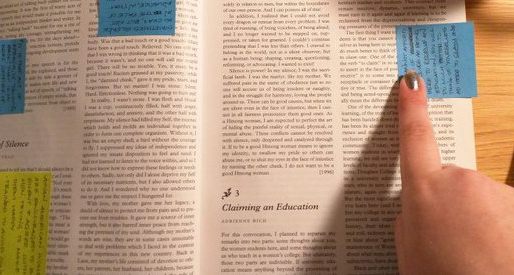
Student Blogs
Vanessa - Preparing for my dissertation
When I started my second year of Diagnostic Radiography & Imaging, I had it on good authority that this year would be intense because we would learn so much more and go into more detail than we did in our first year. But one thing that I was not prepared for was working on my dissertation.... well, kind of. Let me explain....
We are given a module called "Research Methods", which essentially gives us a much smaller research project to work on in order to prepare us for when we start our dissertation in third year. We learn about the different types of research that is out there so that when we do our dissertation, otherwise known as our research project, we have all of the tools at our disposal to create our final piece of work. It sounds overwhelming (and it is) but the way that it is taught allows us all to process the information in bitesize chunks. So, that leads me to what I am working on currently....
For this module, we have been given an essay question to answer, which has us looking at the different ways to conduct research for a particular subject, and analysing them to say why it works and why it doesn't. This piece of work is essentially having us work out the advantages and disadvantages of different types of research. One thing that I didn't realise before I started this module was that there are so many types of research out there in the world. To me, research is research, no? But it actually goes way deeper than I could have ever imagined.
I know that this sounds like a really exciting piece of work (yeah right), and sounds really long-winded, but the truth of the matter is, doing this type of assignment within my second year is really going to help me with my dissertation, and will have me feeling less overwhelmed by it when the time comes for me to start mine next year. Sometimes, you have to trust the assignment and the module that you have been given, because some of them prepare you for things that would have you rocking in a corner somewhere due to the sheer weight of the amount of work that you have to do.
Yes, we have other fun pieces to work on, and yes, I could have written about them, but if I'm being completely honest, the dissertation is something that most academic students cannot escape. And it's good to know that the university is preparing us for what is ahead, so that when the time comes, we will have all of the tools at our disposal to do well.
Some of you might be thinking "but why not do this module in the third year before the final research project?" Well the answer to that is there is no time. Between learning the theory that we need in order to understand diagnostic radiography, hospital placements, and exams, there is just no time. Also, it is good that we are doing this now because before the academic year comes to an end, we have to have hand in our dissertation question, and knowing the question means also knowing the type of research that we will need to do in order to get the answer.
As I mentioned before, this is a much shorter research project than the dissertation and so it has to be handed in by the end of the semester. However, just like the dissertation, we are given lots of support by the academic staff. Our tutors join us in our seminars and help us to understand the research methods in more detail by giving us research scenarios to look at and breaking them down. They are also available to us via email outside of the classroom, so when there are parts of the teaching that we don't understand, they can explain it in a way that is understandable. The staff have truly been great.
So that is what I'm working on! To anyone that is worried about their dissertation, no matter how far away it is for you, don't be! After completing this module, you will be so prepared for it that there will be no fear or hesitation. You will be more than prepared!
Entry requirements
The University of Hertfordshire is committed to welcoming students with a wide range of qualifications and levels of experience. The entry requirements listed on the course pages provide a guide to the minimum level of qualifications needed to study each course. However, we have a flexible approach to admissions and each application will be considered on an individual basis.
| Typical offer (UCAS points) | (enter tariff range) |
|---|---|
| Typical A Level offer | (enter range) |
| Typical IB offer | (enter range) |
| Typical BTEC offer | (enter range) |
| Typical T Level offer | (enter range) |
| GCSE | EG: Grade 4/C in English Language and 4/D Mathematics |
| Access courses | EG: An overall merit profile in 45 credits at Level 3. |
| Additional information | Find out more about our standard and contextual Undergraduate Entry Requirements. |
| English language | All students from non-majority English speaking countries require proof of English language proficiency, equivalent to an overall IELTS score of 6.0 with a minimum of 5.5 in each band. If you do not have the required IELTS or equivalent for direct entry on to your degree programme, our Pre-sessional English and International Foundation courses can help you to achieve this level. |
|---|---|
| Additional information | Find out more about International Entry Requirements. |
| Typical offer (UCAS points) | 120–128 |
|---|---|
| Typical A Level offer | BBB–ABB Mandatory subjects: Grade B and above in science-based subjects such as mathematics, chemistry, biology, physics, sociology, psychology, PE or electronics. Extended Project Qualification will be accepted in the points calculation |
| Typical IB offer | 120–128 Mandatory subjects: Where two subjects have been studied at higher level, one of which is a science at grade H5 or above |
| Typical BTEC offer | DDM Mandatory subjects: Extended Diploma in Applied Science or Extended Diploma in Health and Social Care, to include a minimum of distinction grades in the following mandatory units: Anatomy and Physiology for Health and Social Care, Human Lifespan Development and Enquiries into Current Research in Health and Social Care |
| Accepted T Levels | Healthcare Science; Health; Science |
| GCSE | Grade 4/C in English Language, Mathematics and Science. |
| Access courses | 120–128 Access Diploma should be health care or science based, with a minimum of 45 credits at level 3, of which at least 24 credits are graded at distinction and 21 credits graded at merit |
| Additional information | Find out more about our standard and contextual Undergraduate Entry Requirements. All applicants will be subject to fraud and Enhanced Disclosure and Barring Service (DBS) checks and Occupational Health (OH) Screening on commencement of the programme. |
| English language | All students from non-majority English speaking countries require proof of English language proficiency, equivalent to an overall IELTS score of 7.0 with a minimum of 6.5 in each band. If you do not have the required IELTS or equivalent for direct entry on to your degree programme, our Pre-sessional English and International Foundation courses can help you to achieve this level. |
|---|---|
| Additional information | Find out more about International Entry Requirements. |
Ready to apply?
UK and EU applicants with pre-settled/settled status in the UK
| Start date | Study type | Apply |
|---|---|---|
| September 2025 | Full time - Year 1 | Apply via UCAS |
| Full time - Year 2 | Apply via UCAS | |
| Full time - Year 3 | Apply via UCAS | |
| September 2026 | Full time - Year 1 | Apply via UCAS |
| Full time - Year 2 | Apply via UCAS | |
| Full time - Year 3 | Apply via UCAS |
International and EU applicants without pre-settled status in the UK
Fees and funding
At Herts, we’re dedicated to providing world-class teaching supported by industry-level facilities and incredible social spaces. We believe cost shouldn’t be a barrier to higher education, and we strive to keep both our standard and additional costs as low as possible.
| Study type | Fees | |
|---|---|---|
| UK students | Full time | £9,535 for the 2025/2026 academic year |
| EU students | Full time | £19,100 for the 2025/2026 academic year |
| International students | Full time | £19,100 for the 2025/2026 academic year |
Tuition fees are charged annually. The fees quoted above are for the specified year(s) only. Fees may be higher in future years, for both new and continuing students. Please see the University’s Fees and Finance Policy (and in particular the section headed “When tuition fees change”), for further information about when and by how much the University may increase its fees for future years.
| Scholarships, grants and bursaries | Depending on your circumstances, you may be eligible for a non-repayable scholarship, grant or bursary to support your studies. |
|---|---|
| Disabled Students' Allowance | The Disabled Students’ Allowance can cover any study-related costs you have because of a mental health problem, long term illness or any other disability. |
| Student loans | Find out about securing a student loan, from how much you could be eligible for to when you need to start making repayments. |
| Accommodation costs | We offer a great choice of student accommodation, on campus or nearby in the local area, to suit every student budget. |
| Additional course fees | Read more about additional fees in the course fact sheet. |
More about the course
| Course fact sheets | |
|---|---|
| BSc (Hons) Diagnostic Radiography and Imaging | Download PDF |
| Programme specifications | |
|---|---|
| BSc (Hons) Diagnostic Radiography and Imaging | Download PDF |
| Additional information | |
|---|---|
|
Applications open to international and EU students |
Yes |
Course length |
Full Time, 3 Years |
